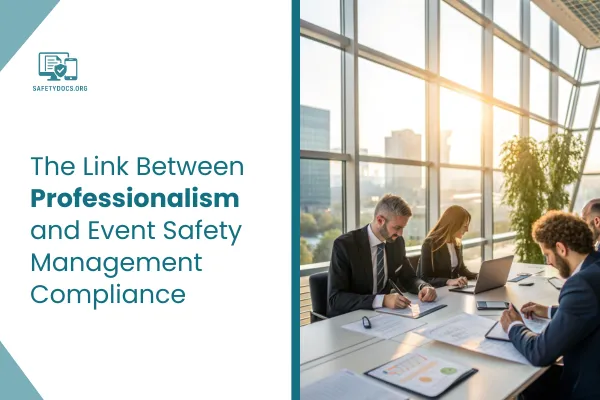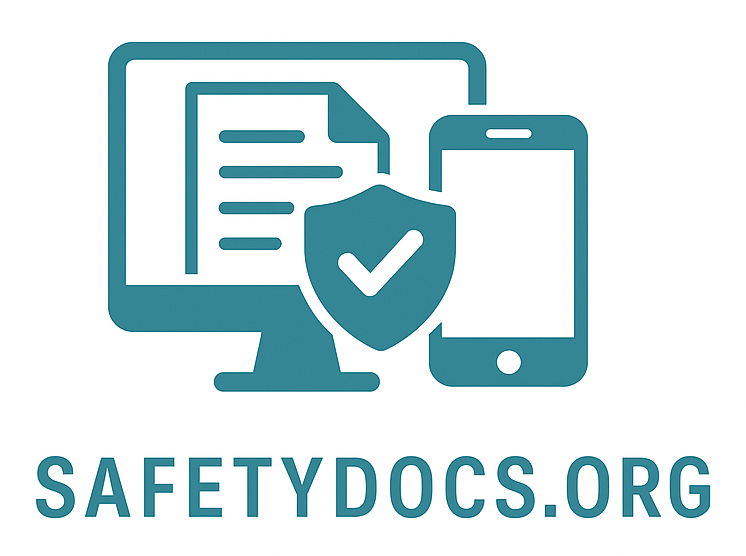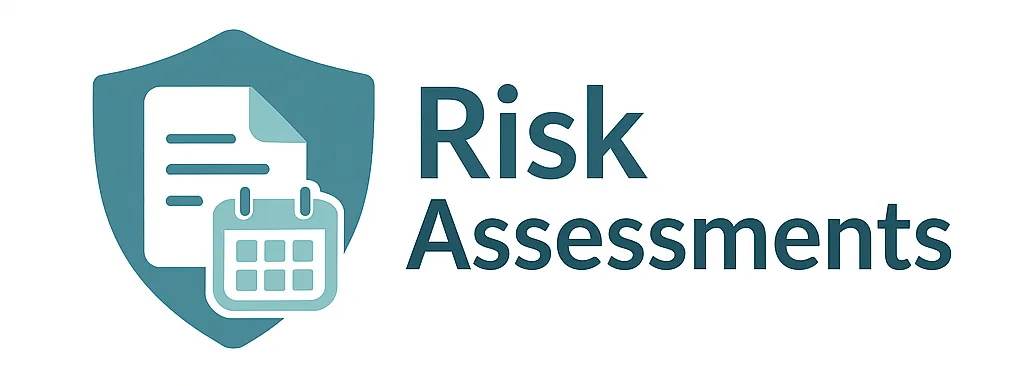
Professionalism-in-Event-Safety-Management-Compliance
The Link Between Professionalism and Event Safety Management Compliance
Why Professionalism Defines Safety Success
When it comes to organising events, professionalism is often judged by the quality of the experience delivered to attendees. Smooth logistics, timely communication, and well-coordinated operations all play a role. Yet, what usually gets overlooked is how closely professionalism is tied to safety compliance.
Event safety isn’t just a behind-the-scenes requirement. It is a visible marker of competence and credibility. Attendees, staff, and authorities all notice when safety protocols are clear, accessible, and well-managed. In today’s regulatory environment, professionalism and compliance go hand in hand, and this is where Event Safety Management becomes essential.
The Growing Demands on Event Organisers
Event organisers face more pressure than ever. It’s not just about putting on a successful show; it’s about keeping people safe in an environment where risks are constantly changing.
Evolving laws such as Martyn’s Law require responsible persons to meet specific standards.
Insurance providers demand detailed safety documentation before issuing coverage.
Attendees and staff expect reassurance that safety has been considered in every detail.
Meeting these expectations is no longer optional. For professionals, safety compliance has become a measure of reliability and trustworthiness.
Why Compliance Equals Professionalism
Professionalism is about being prepared, proactive, and consistent. Safety compliance directly supports these values in several ways:
Preparedness: Having clear safety files, updated risk assessments, and structured emergency plans demonstrates foresight.
Proactivity: Implementing live-syncing safety systems shows commitment to staying one step ahead.
Consistency: Centralised document management ensures teams are always working from the correct version.
In other words, compliance is not just a legal obligation; it is a professional standard that reflects how seriously an organiser takes their responsibility.
How Outdated Systems Undermine Professionalism
Many organisers still rely on static Word or PDF documents stored in shared drives. While these methods may seem convenient, they often reveal cracks in professionalism:
Multiple “final” versions of the same file are floating around.
Confusing document permissions expose either too much or too little information.
Time wasted searching through cluttered folders.
Outdated emergency details that risk being ignored when needed most.
When safety plans fail to meet expectations, it damages the organiser’s credibility with both clients and regulators. No professional wants to be caught unprepared in front of authorities, or worse, in the middle of an incident.
Professional Event Safety in Practice
So what does professional safety management look like in action? It means shifting from reactive planning to proactive systems, and tools like SafetyDocs help by centralising and simplifying the entire process.
1. Live-Syncing Documents
Updates to one master file automatically flow through all related safety documents, ensuring consistency without manual edits.
2. Mobile-Ready Access
Teams can pull up safety files instantly on smartphones, even offline. This speeds up decision-making and avoids confusion.
3. Risk Assessment Templates
Over 65 templates make it easier to design event-specific safety files that align with compliance laws.
4. Secure Cloud Storage
Encrypted storage protects sensitive data, a detail that strengthens professionalism in the eyes of stakeholders.
5. Scalable Solutions
From small weddings to large festivals, professional organisers can manage multiple events within the same system.
The Compliance Standards That Showcase Professionalism
Professional organisers must keep up with more than just operational checklists. Compliance demonstrates a working knowledge of legal and regulatory frameworks. This includes:
Meeting requirements set by Martyn’s Law for counter-terrorism awareness.
Preparing event safety files that cover emergency procedures, crowd management, and medical responses.
Maintaining consistent communication with local authorities and insurance providers is crucial.
Ensuring volunteers and contractors have access to the correct information at the right time.
By integrating compliance into every step, organisers elevate their reputation from being “good event planners” to being trusted professionals.
How Professionalism Builds Trust with Stakeholders
Trust is the foundation of long-term success in the events industry. Clients want reassurance that they are in capable hands. Regulators expect compliance without excuses. Attendees seek safe experiences without disruptions.
Event safety systems create transparency. When organisers can quickly present accurate documents to insurers, licensing officers, or security partners, it signals professionalism. When attendees see visible safety protocols, it builds confidence in the brand.
Event Safety and the Role of Technology
Technology has become the key to bridging the gap between compliance and professionalism. Unlike generic storage solutions, specialised systems like SafetyDocs are built for the live events industry. They address specific challenges such as:
Version control across multiple documents.
Real-time updates during the event.
Access permissions tailored to roles.
Mobile-first usability.
These features not only streamline compliance but also reflect a professional approach to risk management.
Why Small Events Need the Same Professional Standards
It’s tempting to think that small events don’t need professional-grade safety planning. But even private functions, weddings, funerals, and community gatherings fall under compliance requirements.
Professional organisers know that:
Small events are not immune to risks like fire, medical emergencies, or crowd incidents.
Regulators and insurers still expect documented safety files.
Professional reputation grows when safety standards are applied consistently across all event sizes.
By applying the same level of detail to small events, organisers reinforce their professionalism and expand their opportunities in the industry.
Building Professional Confidence Through Compliance
One of the most significant benefits of digital compliance tools is the confidence they give organisers. Knowing that safety plans are accurate, updated, and accessible allows professionals to focus on delivering the event itself.
This confidence translates into smoother operations, less stress, and a stronger professional presence during inspections or emergencies.
Steps to Elevate Your Professional Standards
For organisers aiming to align professionalism with compliance, a few practical steps make a huge difference:
Adopt live document systems instead of static files.
Train staff and volunteers on mobile safety access.
Use templates to build complete, compliant safety files.
Review and update plans regularly to meet new laws.
Secure your documents with encrypted storage.
Each of these actions not only ensures compliance but also enhances the professional image of the organiser.
Conclusion
Professionalism in the events industry is no longer defined solely by execution quality. It’s about demonstrating responsibility, foresight, and compliance. Modern audiences, regulators, and clients expect nothing less.
By integrating compliance into every step of planning, organisers not only meet legal obligations but also elevate their reputation. Tools like SafetyDocs make this achievable without the paperwork panic, ensuring organisers are always compliant, confident, and in control.
Event Safety Management isn’t just a legal requirement. It’s the foundation of professional credibility in today’s event landscape.
Take the stress out of compliance. [Book a Discovery Call with SafetyDocs] or start your 14-day free trial today.
FAQs
1. What is Event Safety Management?
Event Safety Management is the process of planning, documenting, and implementing measures to keep attendees, staff, and venues safe during events.
2. Why is Event Safety Management linked to professionalism?
Compliance with safety laws shows responsibility, preparedness, and credibility, which are key signs of professionalism in event organising.
3. Do small events also need Event Safety Management?
Yes, even small events must meet safety requirements and provide risk assessments, making professional compliance essential.
4. How does technology improve Event Safety Management?
Technology allows live updates, mobile access, version control, and secure storage, making safety planning faster and more reliable.
5. Can Event Safety Management help with legal compliance?
It ensures organisers meet UK safety laws, prepare risk files correctly, and demonstrate due diligence to authorities.

